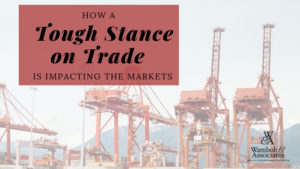The use of tariffs to force trade talks started slowly this past spring, getting more aggressive as we marched into the fall. Retaliation for unfair trade practices are now impacting the economy, but it’s an impact that so far remains modest.
Forecasters surveyed by the Wall Street Journal said the amount of imposed tariffs so far is relatively small and have yet to meaningfully affect the U.S. economy. Trade tensions themselves remain the biggest risk to the economic outlook.
What’s the impact at home? CNBC’s Ylan Mui reported that businesses paid 54% more in tariffs in September compared to a year ago. Meanwhile, exports hit with retaliatory tariffs were down 26% in September. U.S. companies report they are raising prices and changing supply chains to temper the impact, but warn investors that the picture could worsen next year.
Product exemptions increase
Back in March, the Trump Administration imposed sweeping tariffs on imported steel and aluminum and has since, selectively rolled out tariffs on a wide variety of products. Of the 5,745 products that have been tagged with tariffs as they arrive in the U.S. from China, a handful have been exempted from tariffs, including ibuprofen, barite, fluorine salts, and smartwatches.
A range of businesses from enormous energy companies to smaller suppliers of specialty parts have lobbied for tariff exemptions ever since the tariff wars began.
The takeaway
U.S. tariffs appear that they are here to stay, and trade tensions continue to escalate. There are, however, reports that both Trump and Chinese President Xi Jinping may be ready to come to the negotiation table. Any outcomes that lower tariffs, broaden market access and increase imports will lesson tensions.
The U.S. has trade deals with other key trading partners. If China comes to the table to negotiate, that could certainly ease fears and calm the markets. Without negotiations, analysts and economists warn the impact will spread, becoming more meaningful if corporate earnings slow into next year.
Source: Commerce Department, World Health Organization
Follow Us on LinkedIn
Photo by Kyle Ryan on Unsplash
This commentary on this website reflects the personal opinions, viewpoints and analyses of the Wambolt & Associates employees providing such comments, and should not be regarded as a description of advisory services provided by Wambolt & Associates or performance returns of any Wambolt & Associates Investments client. The views reflected in the commentary are subject to change at any time without notice. Nothing on this website constitutes investment advice, performance data or any recommendation that any particular security, portfolio of securities, transaction or investment strategy is suitable for any specific person. Any mention of a particular security and related performance data is not a recommendation to buy or sell that security. Wambolt & Associates manages its clients’ accounts using a variety of investment techniques and strategies, which are not necessarily discussed in the commentary. Investments in securities involve the risk of loss. Past performance is no guarantee of future results.
Wambolt & Associates provides links for your convenience to websites produced by other providers or industry related material. Accessing websites through links directs you away from our website. Wambolt & Associates is not responsible for errors or omissions in the material on third party websites, and does not necessarily approve of or endorse the information provided. Users who gain access to third party websites may be subject to the copyright and other restrictions on use imposed by those providers and assume responsibility and risk from use of those websites.



